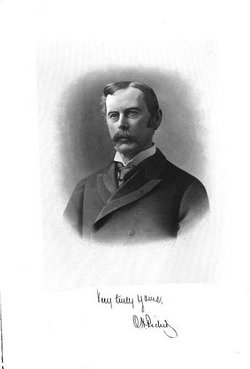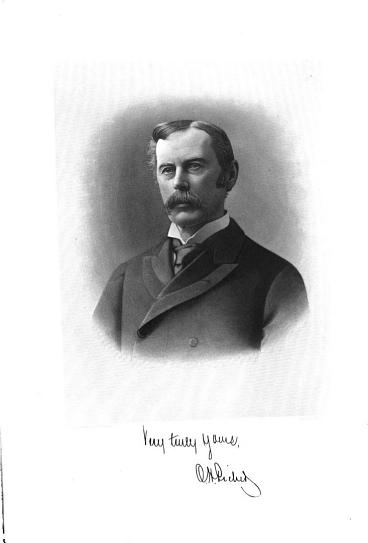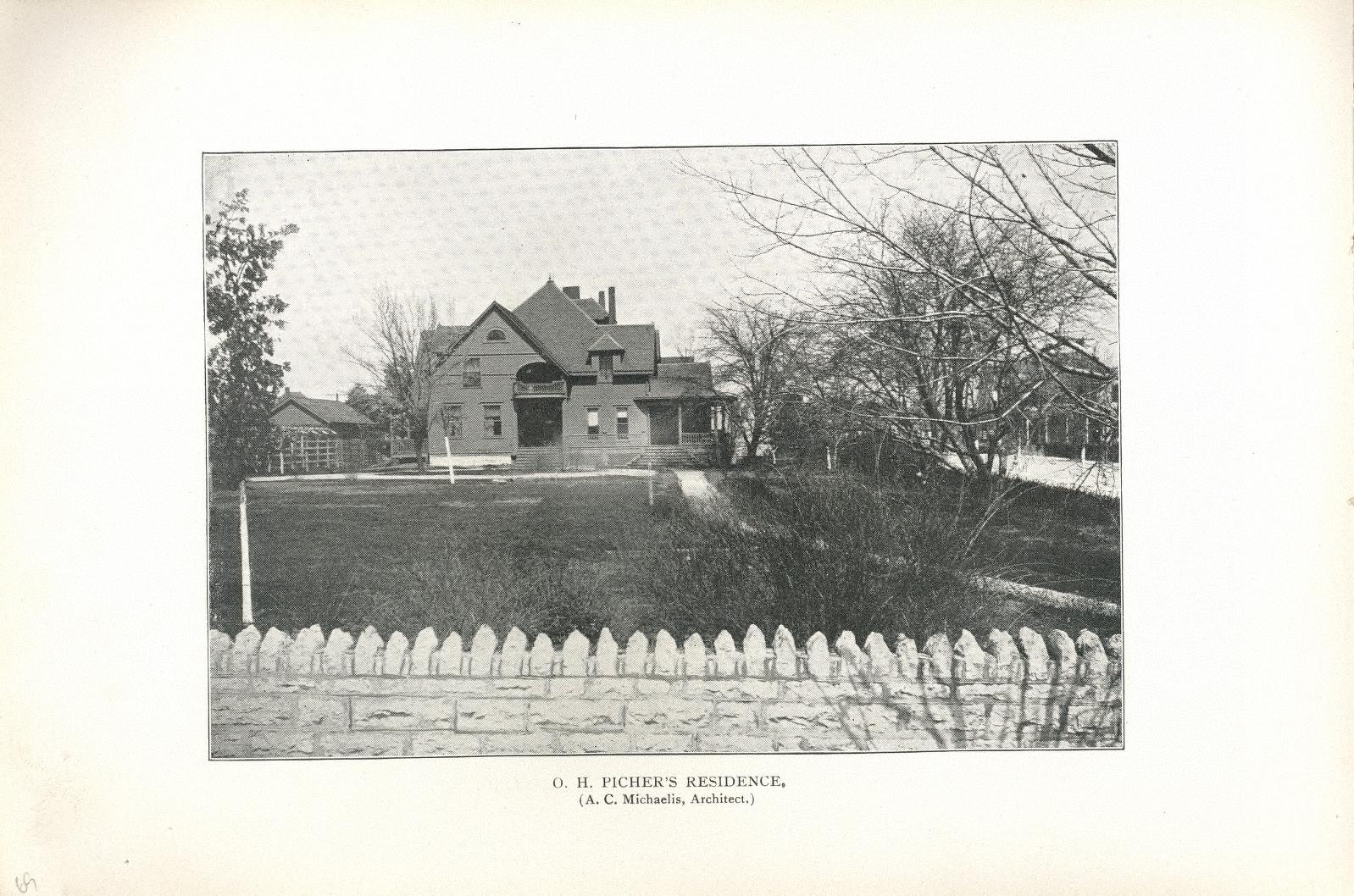Encyclopedia of the History of Missouri
Picher, Oliver H., mine operator, was born April 18, 1845, at Madison, Indiana. His parents were Oliver Sheppard and Mary Ann (Fitch) Picher, the former a native of Wareham, Massachusetts, and the latter of Baltimore, Maryland; their marriage took place in the city where their son was born, and where he received his earliest education. When he was ten years of age, his parents removed to Galesburg, Illinois, where the father busied himself in his profession, that of the law. The son attended Knox Academy, a preparatory school, until he was sufficiently advanced, when he entered Knox College, from which he was graduated at the end of the full classical course in 1864. A notable incident of his student life was his presence in the great assemblage which heard Abraham Lincoln deliver his famous "House divided against itself" speech, in the course of the debate with Stephen A. Douglas. In war days it was with great difficulty that the students were held to their studies. In April preceding the June in which Mr. Picher's class would have graduated, a sufficient number of the Knox College students enlisted to form about one-half of company C, in the One Hundred and Thirty-Seventh Regiment of Illinois Infantry Volunteers. As they had practically completed the course of study these patriotic students were granted their degrees by the college faculty. Mr. Picher became a member of the company thus formed and was commissioned first lieutenant. This command formed a part of the forces at Memphis, Tennessee, when General Forrest made his dash into that city, and was the first to offer resistance. At the close of the war, he returned to Galesburg, where his scholarly attainments received high recognition in his appointment as tutor of Greek, Latin and the higher mathematics, in the institution from which he was graduated two years before. He relinquished this position in April, 1866, to remove to Springfield, Missouri, where he took up law studies, and was admitted to the bar in 1867. He then entered upon practice at Carthage, associated with M. G. McGregor, afterward circuit judge. In 1869 a court of common pleas was created, and he was appointed judge; at the ensuing election, he was elected to the same position for the full term. In 1874 he removed to Chicago, Illinois, to become a member of the law firm of Wilson, McDaid & Picher. In 1875 he took up his residence in Joplin, Missouri, and engaged in mining and smelting in connection with his brother William, and from that time until the present has been engaged in some of the most important enterprises connected with those industries. In January, 1876, the Picher Lead and Zinc Company was organized, which became the Picher Lead Company in 1889. Mr. Picher was president at the organization, and has been continued in that position until the present time. The works of this company have formed a very large part of the industries which have made Joplin world-famous. In their operations and magnitude they excel any lead manufactory in the United States, and except at Bristol, England, there are none in the world with which they may be compared. Here alone are carried on the processes by which the lead fumes from the furnaces are utilized, being collected, filtered, and converted into sublimed white lead, of the highest possible grade as a pigment. In addition to his interest in this great establishment, he is also interested in various companies owning and operating mining lands, and in several he is an active director. During all these years, he has taken time for other enterprises, some of a directly financial character, and others of that uncompensated nature which are accepted by the publicspirited citizen who seeks the growth and development of the city which is his home. Among public concerns, may be mentioned his connection with the Joplin Waterworks, to which he gave his earnest effort at the inception—being President at that time—and of which he was one of the original directors. In politics, he is Republican, holding the principles of that party to be those of true Americanism, and its policies as affording the only substantial foundation for commercial and financial stability. He is a member of the Presbyterian Church. In the Masonic Order, he holds membership with Fellowship Lodge, No. 345, Joplin Royal Arch Chapter, No. 91 Ascension Commandery, No. 39—of which he is past eminent commander—all of Joplin; in Ararat Temple of the Mystic Shrine, and the Consistory of Western Missouri, thirty-second degree, of Kansas City. Judge Picher was married, May 7, 1874, to Miss Mary Thompson Sheppard, of Springfield, Missouri, who died September 5, 1875; of this marriage was born, June 30, 1875, a son, Oliver Sheppard Picher, who graduated from Stanford University in the class of 1898, and is now a student at Columbia Law School, New York City. He was again married October 17, 1880, to Miss Harriet Grace Woods, of Joplin; one daughter was born of this union, Harriet Woods Picher, who is a student at Lindenwood College, of St. Charles, Missouri. Judge Picher continues to give close personal attention to his large interests, but is not immersed in them to such a degree as to forego the rational pleasures of association with his neighbors and friends in those relations which involve efforts for the common good, and assistance to individuals in commendable enterprises. Joplin has not known a more efficient factor in its making and development. In this achievement, he has displayed in highest degree, wise discernment, fixed purpose, and masterly conduct of affairs. His wealth and distinguished success are due to no unlooked-for turn of fortune. His life has been one of arduous struggle, at times of deprivation, and again, disappointment and failure have appeared almost inevitable. Only a strong resourceful man, and one whose integrity would command confidence, could
have accomplished such great results. And it is one of the most admirable traits of Judge Picher's character that in all he bears himself modestly and unassumingly, awarding to his colleagues the highest possible commendation for their co-operation in those important enterprises which have engaged his endeavors during many momentous years.
Encyclopedia of the History of Missouri
Picher, Oliver H., mine operator, was born April 18, 1845, at Madison, Indiana. His parents were Oliver Sheppard and Mary Ann (Fitch) Picher, the former a native of Wareham, Massachusetts, and the latter of Baltimore, Maryland; their marriage took place in the city where their son was born, and where he received his earliest education. When he was ten years of age, his parents removed to Galesburg, Illinois, where the father busied himself in his profession, that of the law. The son attended Knox Academy, a preparatory school, until he was sufficiently advanced, when he entered Knox College, from which he was graduated at the end of the full classical course in 1864. A notable incident of his student life was his presence in the great assemblage which heard Abraham Lincoln deliver his famous "House divided against itself" speech, in the course of the debate with Stephen A. Douglas. In war days it was with great difficulty that the students were held to their studies. In April preceding the June in which Mr. Picher's class would have graduated, a sufficient number of the Knox College students enlisted to form about one-half of company C, in the One Hundred and Thirty-Seventh Regiment of Illinois Infantry Volunteers. As they had practically completed the course of study these patriotic students were granted their degrees by the college faculty. Mr. Picher became a member of the company thus formed and was commissioned first lieutenant. This command formed a part of the forces at Memphis, Tennessee, when General Forrest made his dash into that city, and was the first to offer resistance. At the close of the war, he returned to Galesburg, where his scholarly attainments received high recognition in his appointment as tutor of Greek, Latin and the higher mathematics, in the institution from which he was graduated two years before. He relinquished this position in April, 1866, to remove to Springfield, Missouri, where he took up law studies, and was admitted to the bar in 1867. He then entered upon practice at Carthage, associated with M. G. McGregor, afterward circuit judge. In 1869 a court of common pleas was created, and he was appointed judge; at the ensuing election, he was elected to the same position for the full term. In 1874 he removed to Chicago, Illinois, to become a member of the law firm of Wilson, McDaid & Picher. In 1875 he took up his residence in Joplin, Missouri, and engaged in mining and smelting in connection with his brother William, and from that time until the present has been engaged in some of the most important enterprises connected with those industries. In January, 1876, the Picher Lead and Zinc Company was organized, which became the Picher Lead Company in 1889. Mr. Picher was president at the organization, and has been continued in that position until the present time. The works of this company have formed a very large part of the industries which have made Joplin world-famous. In their operations and magnitude they excel any lead manufactory in the United States, and except at Bristol, England, there are none in the world with which they may be compared. Here alone are carried on the processes by which the lead fumes from the furnaces are utilized, being collected, filtered, and converted into sublimed white lead, of the highest possible grade as a pigment. In addition to his interest in this great establishment, he is also interested in various companies owning and operating mining lands, and in several he is an active director. During all these years, he has taken time for other enterprises, some of a directly financial character, and others of that uncompensated nature which are accepted by the publicspirited citizen who seeks the growth and development of the city which is his home. Among public concerns, may be mentioned his connection with the Joplin Waterworks, to which he gave his earnest effort at the inception—being President at that time—and of which he was one of the original directors. In politics, he is Republican, holding the principles of that party to be those of true Americanism, and its policies as affording the only substantial foundation for commercial and financial stability. He is a member of the Presbyterian Church. In the Masonic Order, he holds membership with Fellowship Lodge, No. 345, Joplin Royal Arch Chapter, No. 91 Ascension Commandery, No. 39—of which he is past eminent commander—all of Joplin; in Ararat Temple of the Mystic Shrine, and the Consistory of Western Missouri, thirty-second degree, of Kansas City. Judge Picher was married, May 7, 1874, to Miss Mary Thompson Sheppard, of Springfield, Missouri, who died September 5, 1875; of this marriage was born, June 30, 1875, a son, Oliver Sheppard Picher, who graduated from Stanford University in the class of 1898, and is now a student at Columbia Law School, New York City. He was again married October 17, 1880, to Miss Harriet Grace Woods, of Joplin; one daughter was born of this union, Harriet Woods Picher, who is a student at Lindenwood College, of St. Charles, Missouri. Judge Picher continues to give close personal attention to his large interests, but is not immersed in them to such a degree as to forego the rational pleasures of association with his neighbors and friends in those relations which involve efforts for the common good, and assistance to individuals in commendable enterprises. Joplin has not known a more efficient factor in its making and development. In this achievement, he has displayed in highest degree, wise discernment, fixed purpose, and masterly conduct of affairs. His wealth and distinguished success are due to no unlooked-for turn of fortune. His life has been one of arduous struggle, at times of deprivation, and again, disappointment and failure have appeared almost inevitable. Only a strong resourceful man, and one whose integrity would command confidence, could
have accomplished such great results. And it is one of the most admirable traits of Judge Picher's character that in all he bears himself modestly and unassumingly, awarding to his colleagues the highest possible commendation for their co-operation in those important enterprises which have engaged his endeavors during many momentous years.
Family Members
Sponsored by Ancestry
Advertisement
Advertisement








